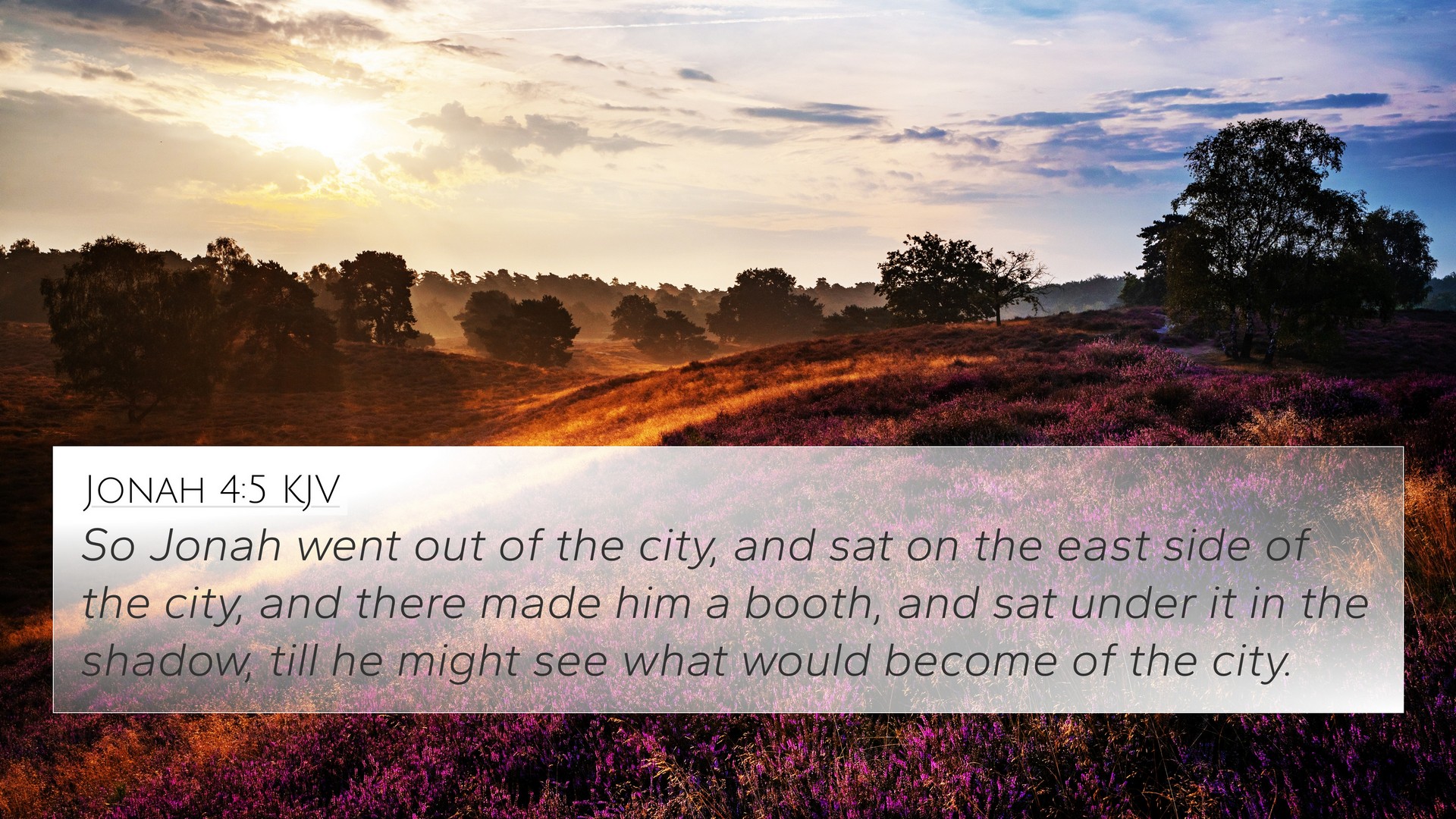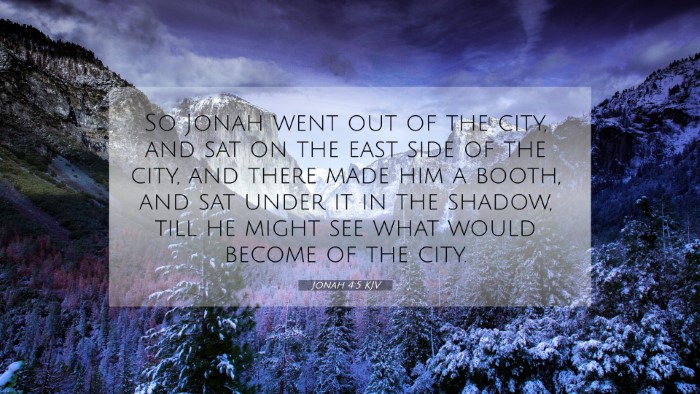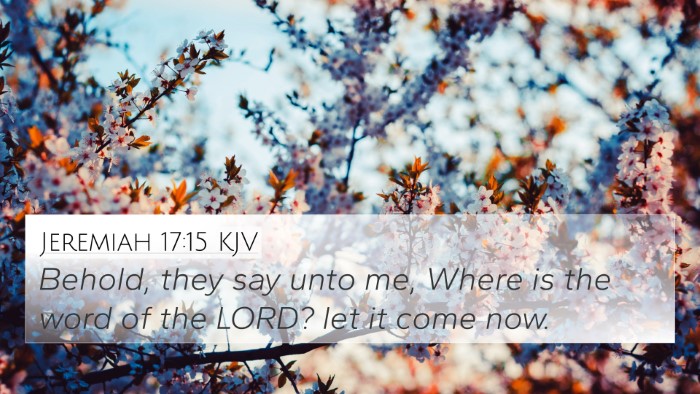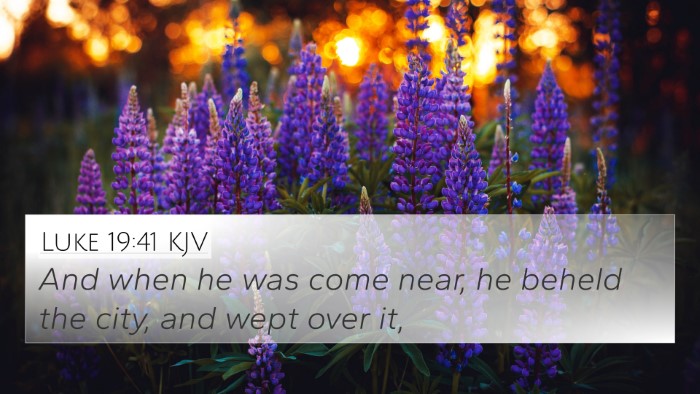Old Testament
Genesis Exodus Leviticus Numbers Deuteronomy Joshua Judges Ruth 1 Samuel 2 Samuel 1 Kings 2 Kings 1 Chronicles 2 Chronicles Ezra Nehemiah Esther Job Psalms Proverbs Ecclesiastes Song of Solomon Isaiah Jeremiah Lamentations Ezekiel Daniel Hosea Joel Amos Obadiah Jonah Micah Nahum Habakkuk Zephaniah Haggai Zechariah MalachiJonah 4:5 Similar Verses
Jonah 4:5 Cross References
So Jonah went out of the city, and sat on the east side of the city, and there made him a booth, and sat under it in the shadow, till he might see what would become of the city.
Uncover the Rich Themes and Topics of This Bible Verse
Listed below are the Bible themes associated with Jonah 4:5. We invite you to explore each theme to gain deeper insights into the Scriptures.
Jonah 4:5 Cross Reference Verses
This section features a detailed cross-reference designed to enrich your understanding of the Scriptures. Below, you will find carefully selected verses that echo the themes and teachings related to Jonah 4:5 KJV. Click on any image to explore detailed analyses of related Bible verses and uncover deeper theological insights.
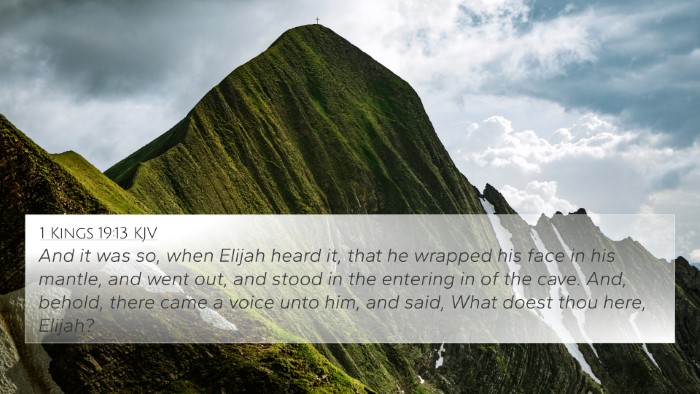
1 Kings 19:13 (KJV) »
And it was so, when Elijah heard it, that he wrapped his face in his mantle, and went out, and stood in the entering in of the cave. And, behold, there came a voice unto him, and said, What doest thou here, Elijah?
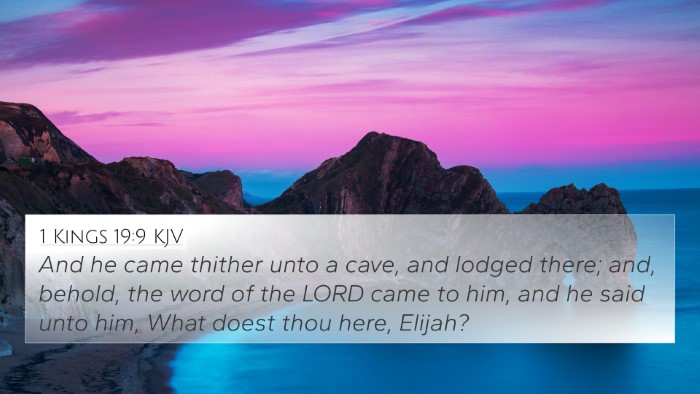
1 Kings 19:9 (KJV) »
And he came thither unto a cave, and lodged there; and, behold, the word of the LORD came to him, and he said unto him, What doest thou here, Elijah?
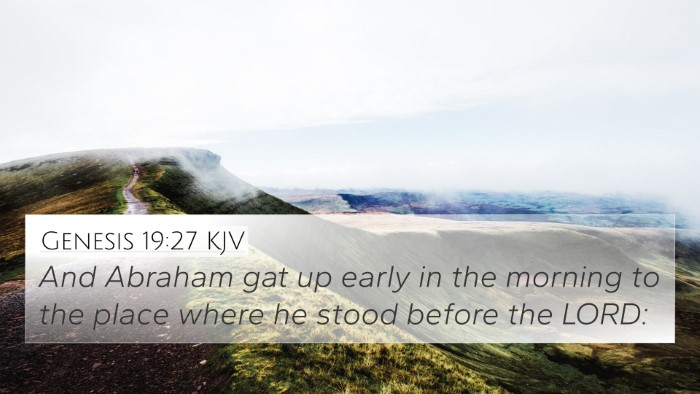
Genesis 19:27 (KJV) »
And Abraham gat up early in the morning to the place where he stood before the LORD:
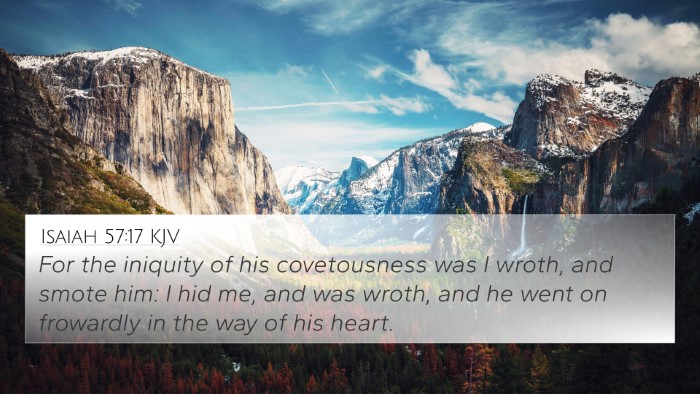
Isaiah 57:17 (KJV) »
For the iniquity of his covetousness was I wroth, and smote him: I hid me, and was wroth, and he went on frowardly in the way of his heart.
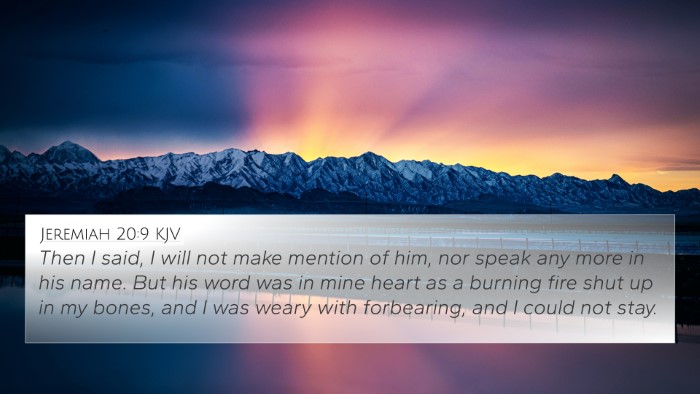
Jeremiah 20:9 (KJV) »
Then I said, I will not make mention of him, nor speak any more in his name. But his word was in mine heart as a burning fire shut up in my bones, and I was weary with forbearing, and I could not stay.
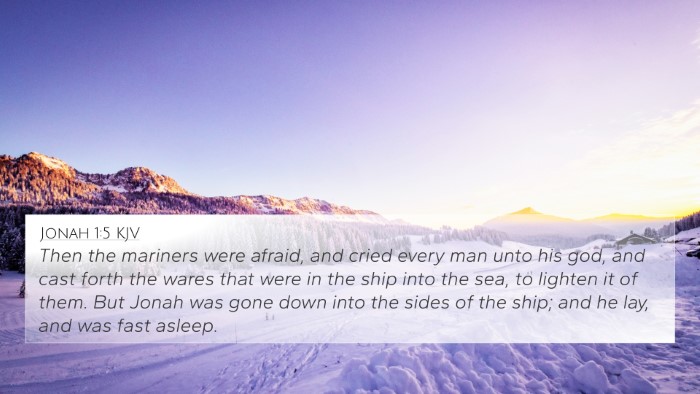
Jonah 1:5 (KJV) »
Then the mariners were afraid, and cried every man unto his god, and cast forth the wares that were in the ship into the sea, to lighten it of them. But Jonah was gone down into the sides of the ship; and he lay, and was fast asleep.
Jonah 4:5 Verse Analysis and Similar Verses
Understanding Jonah 4:5
Context of Jonah 4:5: In this verse, we find Jonah retreating to a place outside the city of Nineveh, seeking solitude to witness what would happen to the city after his prophetic warnings. His actions reflect a complex emotional state that oscillates between anger, hope, and despair regarding God's mercy towards the Ninevites.
Verse Text
“And Jonah went out of the city, and sat on the east side of the city, and there made him a booth, and sat under it in the shadow, till he might see what would become of the city.” (Jonah 4:5)
Summary of Insights
This verse encapsulates Jonah's conflicted feelings about God's merciful nature and his personal expectations of divine judgment. Below we explore the insights from various public domain commentaries.
Matthew Henry's Commentary
Matthew Henry notes that Jonah's act of leaving the city demonstrates both his disappointment and his lingering hope for the fire of God's judgment to fall upon Nineveh. His isolation symbolizes the broader Jewish reluctance to accept God's extending grace to Gentiles. This reveals a theological conflict inherent within Jonah, reflective of a larger narrative within Israel's relationship with God's kindness.
Albert Barnes' Notes
Albert Barnes emphasizes the metaphorical significance of Jonah making a booth. He suggests it represents a temporary shelter—reflecting Jonah’s temporary acceptance of God’s mission intertwined with his unresolved feelings. Additionally, Barnes highlights the physical act of sitting and waiting, which symbolizes not just Jonah's prophetic vigilance but also a passive resistance to God’s will.
Adam Clarke's Commentary
Adam Clarke remarks on the significance of the east side of the city, suggesting that this geographical detail may underline Jonah's separation from the city. The act of sitting under the booth signifies his desire for shade, which is also interpreted as a longing for relief from spiritual and emotional tumult. Clarke also notes that this decision signals a lack of joy in witnessing repentance, a stark contrast to the expected joy of a prophet seeing his words bear fruit.
Key Themes
- Isolation and Reflection: Jonah isolates himself, reflecting his inner turmoil.
- Expectancy and Rejection: Jonah's waiting indicates a mix of hope and rejection towards God's mercy.
- God's Mercy: A central theme in Jonah’s story, illustrating the conflict between human expectation and divine grace.
Bible Verse Cross-References
In considering Jonah 4:5, several Bible verses emerge as significant cross-references reflecting similar themes of mercy, judgment, and prophetic experience:
- Jeremiah 18:7-8: Illustrates God's willingness to relent from judgment if the people turn from their ways.
- Luke 19:41-44: Jesus laments over Jerusalem, showcasing a parallel of divine compassion and human destruction.
- Matthew 12:41: Jesus refers to Nineveh's repentance as a testimony against the unrepentant generation of His time.
- Romans 10:12-13: Affirms that salvation is available to all, not just a chosen few, echoing the theme of God's inclusivity.
- 2 Peter 3:9: Highlights God's patience and desire for all to come to repentance.
- Exodus 34:6-7: Describes God's nature as merciful and gracious, providing a foundational understanding of His character.
- Micah 7:18-19: Explores God's forgiveness and compassion, further connecting to Jonah's struggle.
Connecting Biblical Insights
The connections between Jonah 4:5 and these referenced scriptures illuminate a broader understanding of messianic themes wherein God's nature exhibits both justice and mercy. Jonah serves as a critical figure embodying a struggle that many believers face regarding God's forgiveness towards those considered undeserving.
Practical Applications
For readers seeking to apply the insights of Jonah 4:5 into their lives, here are some suggestions:
- Embrace God's Mercy: Reflect on how God's grace has touched your life and find ways to extend that grace to others.
- Contemplate Isolation: In times of retreat or isolation, consider what God may be teaching about His plans for others.
- Seek Understanding: Engage in cross-referencing Bible passages to uncover thematic links that resonate with your faith journey.
Conclusion
In conclusion, Jonah 4:5 invites readers to reflect on the complexities of God’s mercy, human indignation, and the vast nature of divine grace. Through cross-reference studies, one can explore not only connections between this verse and others but also integrate these insights into a deeper understanding of scriptural narratives.
By utilizing tools for Bible cross-referencing, individuals can cultivate a richer theological perspective and enhance their spiritual growth.
